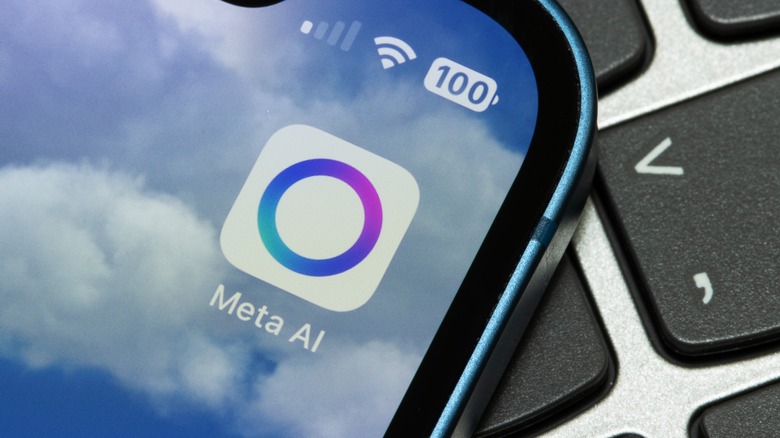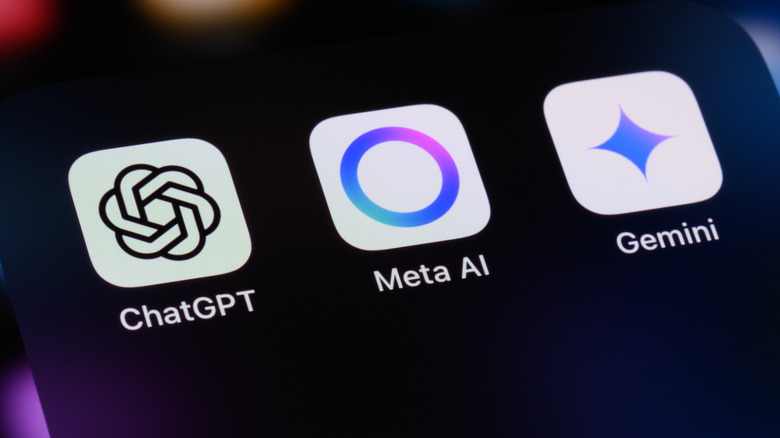Meta Is Slashing Hundreds Of AI Jobs – Here's What's Going On
In mid-2025, Meta was offering pay packages in the $100-300 million range to AI researchers. The company even went as far as offering a compensation package allegedly valued at over a billion dollars to a single AI researcher, as Wired reported in July 2025. But there's a grim side to the AI frenzy, too. In October 2025, Meta confirmed to CNBC that it was laying off nearly 600 people from its AI division.
"Workers across Meta's AI infrastructure units, Fundamental Artificial Intelligence Research unit (FAIR), and other product-related positions will be impacted," the outlet reported, citing an internal memo. The move is something of a shocker, considering the fact that Meta CEO Mark Zuckerberg had committed to spending hundreds of billions of dollars to strengthen the company's position in the AI race in July.
I am one of the folks laid off by Meta yesterday. I am a new graduate joining on 8/18 (the same cohort as Jiaxun in the Meta AI Accelerate program), working on post training and evaluations for Meta AI Assistant. Welcome to DM me. My email is zhiwenowenjiang@gmail.com
— Zhiwen (Owen) Jiang (@OwenZhiwen) October 23, 2025
Apparently, the company axed employees from its legacy AI development teams, sparing the recent superstar AI talent that was brought in with pay packages surpassing NBA athletes. It seems the company is consolidating its AI development efforts within the new Meta Superintelligence Labs (MSL) arm, which was established following the acquisition of ScaleAI.
Zuckerberg was reportedly unhappy with the progress made by Meta's AI teams, particularly with the low uptake of its Llama AI models in the developer community compared to rivals such as OpenAI's GPT, Google's Gemini, Anthropic's Claude, and Asian upstarts such as Deepseek. Interestingly, some of the folks who were let go were well-known AI researchers and quickly attracted numerous job proposals after posting on X about their exit from Meta.
Deep cuts, but the hunger persists
Alexandr Wang, Meta's chief AI officer, told employees that the downsizing will allow each remaining member of the Superintelligence team to make a bigger impact. In a memo seen by Business Insider, Wang mentioned that the laid-off employees will get a chance to explore other roles within the company. As per The Wall Street Journal, Meta has lately sped up its efforts to develop AI models and stay afloat in the cut-throat segment, following the disappointing launch of its most recent Llama AI model.
Interestingly, the company has no plans to pause hiring of more top-tier AI researchers. "This by no means signals any decrease in investment. In fact, we will continue to hire industry-leading Al-native talent," Wang declared in the memo. According to The New York Times, the role cuts were mostly concentrated within the FAIR group, which helped develop Meta's Llama family of AI models. The TBD Lab, which comprises the recently hired AI talent and is now working on Meta's foundation plans moving ahead, remains unaffected.
The AI-focused Superintelligence division isn't the only part of Meta to have experienced layoffs in 2025. Employees were also let go from its risk group, with the company telling employees that their work was being automated. This was preceded by Meta ending its fact-checking program in January, with the company's platforms pivoting to a community-sourced system instead.
Meta's playing catch-up in the AI race
The biggest names in the current AI landscape are Microsoft, Google, OpenAI, and Anthropic. Meta's Llama models appear on AI benchmark leaderboards from time to time, but they are far behind names such as Copilot, Gemini, ChatGPT, and Claude. All of these have found mainstream adoption in a lot of ways, and feature in software that people use daily.
Meta AI, or Llama, has yet to gain widespread support in a third-party product or even evolve into a useful product of its own, despite tools such as the code-fixing Code Llama. So far, the only sizeable platforms where Meta's AI has found a footing are its own apps — Instagram, Facebook, and WhatsApp — and the smart glasses it made in collaboration with Ray-Ban and Oakley. But the company hasn't stopped trying: Just a month ago, Meta launched a video app called Vibes that was all about AI-generated videos, although it was widely ridiculed as an AI slop machine. During Meta's most recent earnings call, Zuckerberg noted that the company will push more AI content via its algorithm on social media platforms.
The competition, on the other hand, is far ahead. OpenAI has ChatGPT with its own set of advanced tools, such as Deep Research, numerous subscription tiers, Sora video generator, Atlas web browser, and Apple Intelligence integration. Microsoft's Copilot is now at the heart of its widely used Office and 365 suite. In a similar vein, Google's Gemini models are also deeply integrated across the Workspace software. Most importantly, all these rival AI products have now created a steady revenue stream of their own, while Meta is still trying to find a niche for its AI offerings.


